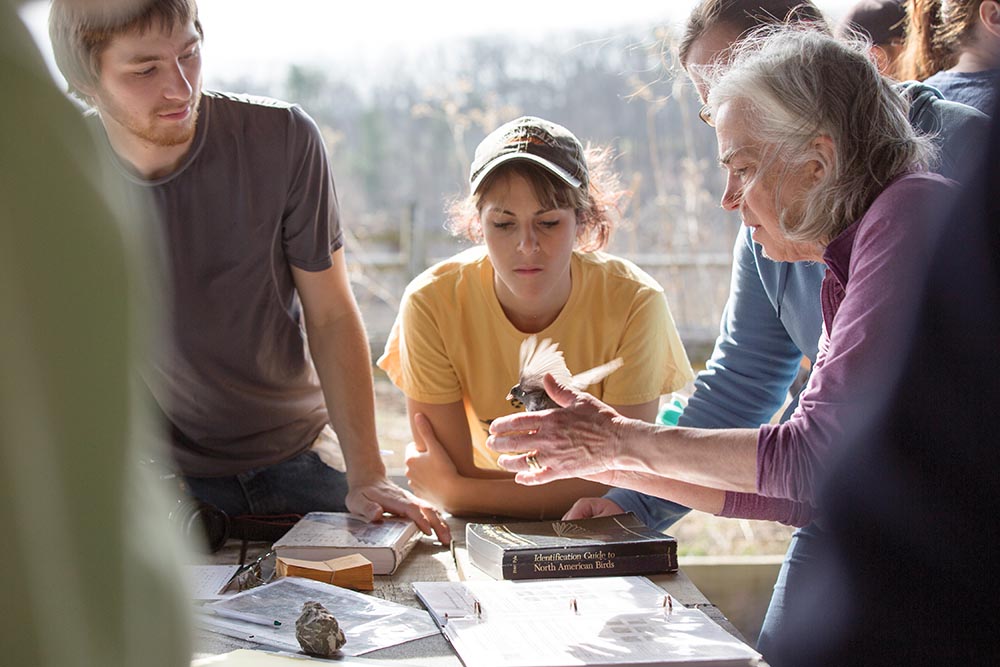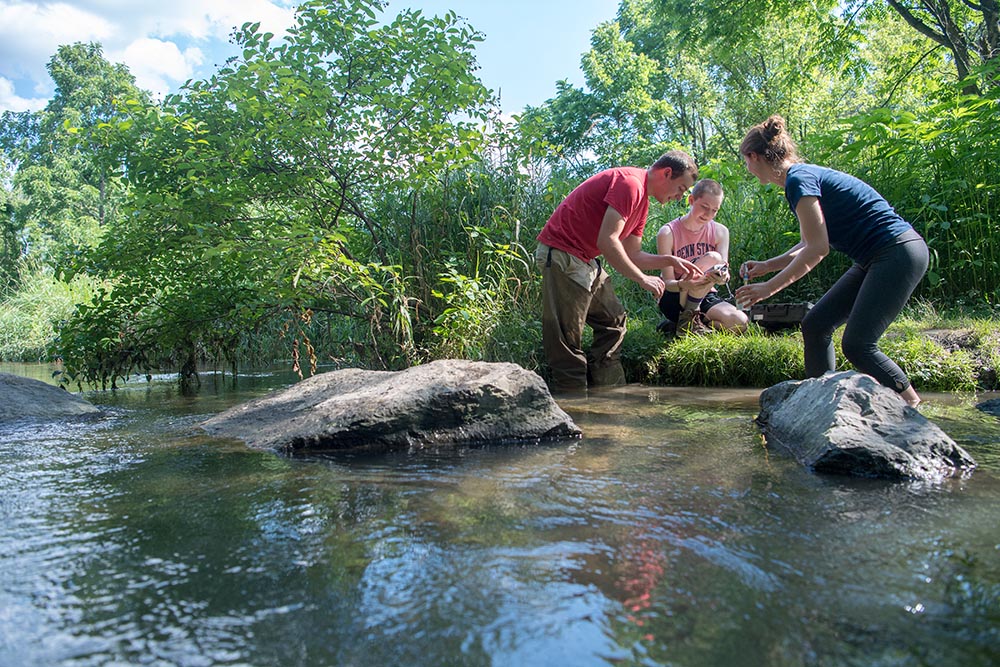Wildlife and Fisheries Science Major
Take your career into the wild.
Hard science and hands on, this is in-the-field study of fish, wildlife, and their ecosystems to ensure their sustainability into the future. Grads work for state and federal agencies, conservation organizations, or continue on to advanced degrees.
Biology, bug spray, and backpacks.
Your Wildlife and Fisheries Science education starts with the classic classroom science challenges—biology, chemistry, and physics. But don’t get too comfortable at your desk. We roll up our sleeves, get our feet wet, break a sweat, and take our curiosity to forests, fields, rivers, and lakes that fish and wild animals call home. A good pair of boots are essential scientific instruments in this major. The Pennsylvania wilds are our laboratory.
Wildlife and Fisheries Science is the right major if you’re:
- fascinated by wild animals and fish
- passionate about the conservation of our precious natural resources
- a solid science student
- best at learning hands on
- outdoorsy and love doing something different everyday
See the University Bulletin for details on program requirements, suggested academic plan, and more.
Ag Journeys
“College is the time to try new things.”
– Hunter Kauffman
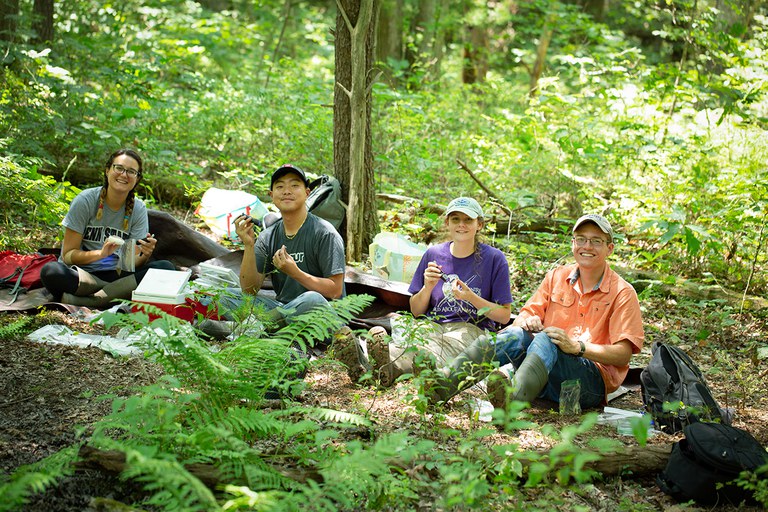
Choose your own adventure.
The syllabus is just the beginning of your Wildlife and Fisheries Science experience. There are faculty-guided clubs, internships, externships, or hands-on research opportunities for every kind of academic interest, and every kind of fun.
¿Cómo se dice trout? Study abroad opportunities abound for those who want to push borders of every kind.
Craft your experience.
Related clubs and teams
- Penn State Fly Fishing Club
- Penn State Lumber Lions
- Penn State Spur Collectors
- Society of American Foresters
- The Wildlife Society
- See all clubs and teams
Recent internships
- Animal care intern
- Bat technician
- Biologist aide
- Field research assistant
- Field traineeship
- GIS intern
- Seasonal fisheries biologist aide
- Tour guide
Popular study abroad
- Christchurch: Lincoln University
- Costa Rica Tropical Field Ecology
- School for Field Studies, Tanzania
- South Africa: Parks and People
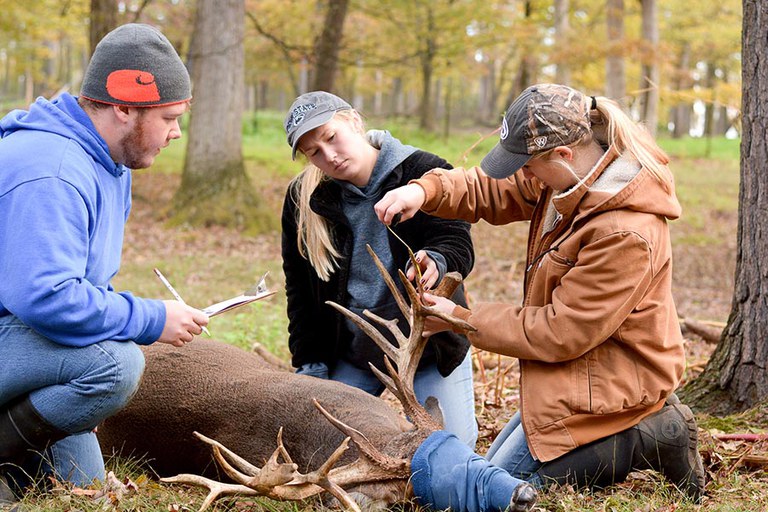
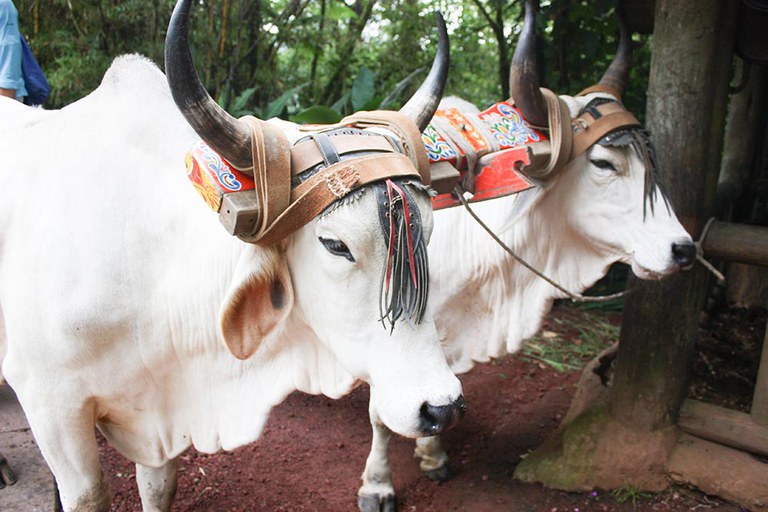
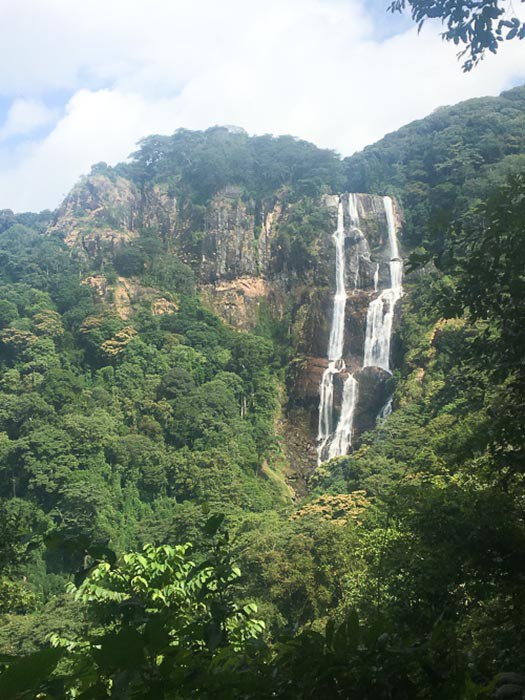
A college experience you’ll love—in a field where you can make a difference.
Penn State Wildlife and Fisheries Science grads are all over the world protecting wild animals and the ecosystems where they live.
Our alumni out in the world
- Aquariums
- Conservation districts
- Environmental education centers
- Fish hatcheries
- Graduate and professional schools
- State and national parks
- Universities
- Wildlife management agencies
- Zoos
Wildlife and Fisheries Science Career Options
What can I do with a Wildlife and Fisheries Science degree? Here are just a few career examples:
Wildlife/fisheries biologist
A wildlife/fisheries biologist studies aquatic and land animals, their environments, and human impacts on their ecosystems to ensure sustainability of fish and wildlife populations.
What will I do?
- Conduct census projects, research studies, and complex data analyses of wild animals
- Study diseases that affect animals and their transmission
- Trap, tag, or relocate animals and fish for conservation purposes
- Publish findings in academic and scientific journals
- Collaborate with game wardens and law enforcement personnel
Game warden/conservation officer
A game warden/conservation officer enforces hunting and fishing laws and regulations.
What will I do?
- Serve as a law enforcement officer—investigate criminal behavior, gather evidence, make arrests, and testify in court
- Teach fishing and hunter education and firearms safety
- Observe wildlife and their environment, and collaborate with agency biologists
Hatchery manager
A hatchery manager directs and oversees fish farm and fish hatchery activities, where aquatic life is cultivated, cared for, studied, and then released into their natural habitat or harvested for food.
What will I do?
- Train and supervise hatchery staff
- Prepare and distribute food and medications
- Monitor fish health and growth
- Maintain equipment and monitor water quality
- Coordinate with research/conservation organizations
Environmental education specialist
An environmental education specialist teaches wildlife/fisheries biology and conservation.
What will I do?
- Lead field trips and classroom programs
- Facilitate teacher workshops
- Create educational materials for use in presentations, including posters, banners, and workbooks
Wildlife and Fisheries Science students in the news
April 10, 2024
Three Penn Staters earn national Goldwater Scholarships
Penn State undergraduates Nate Carey, Bridget Reheard and Mabel Tong have earned the 2024 Goldwater Scholarship, a national award that recognizes undergraduates who show exceptional potential as leaders.
Read More
April 24, 2023
Penn State recognizes Outstanding Adult Student Award winners
Penn State’s Adult Learner Programs and Services announced the winners of the Outstanding Adult Student Award. The award — which includes a Penn State diploma case and a $500 grant — recognizes an exceptional adult learner or student veteran at University Park who has overcome obstacles while furthering his or her education. Nominees balance multiple responsibilities, serve as role models for other students, and achieve academically.
Read More
December 2, 2022
Internships earn awards for College of Agricultural Sciences students
Twelve Penn State students have been selected as College of Agricultural Sciences Alumni Society 2022 Internship Award winners. The award, which includes a $1,000 stipend, was established to encourage students to participate in a credit or noncredit educational internship program related to their field of study.
Read More
November 9, 2021
Internships earn awards for College of Agricultural Sciences students
Ten Penn State students have been selected as College of Agricultural Sciences Alumni Society 2021 Internship Award winners. The award, which includes a $1,200 stipend, was established to encourage students to participate in a credit or noncredit educational internship program that relates to their field of study.
Read More

